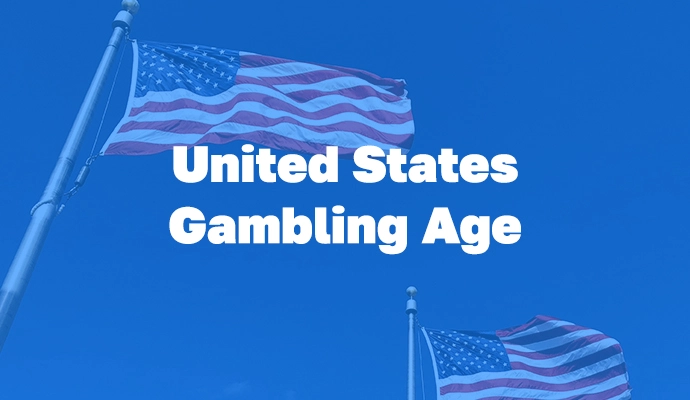
In the United States, some states set the legal gambling age at 18, others require players to be 21 or older.
US Legal Gambling Age by State
| State | Casinos | Sports Betting | Poker | Bingo | Lottery | Horse/Dog Racing |
|---|---|---|---|---|---|---|
| Alabama | 21 | – | – | 19 | 19 | – |
| Alaska | 18 | – | – | – | – | – |
| Arizona | 21 | 21 | 21 | 18 | 21 | 18 |
| Arkansas | 21 | 21 | 21 | 18 | 18 | 18 |
| California | 18/21 | 18/21 | 18/21 | 18 | 18 | 18 |
| Colorado | 21 | 21 | 18 | 18 | 18 | 18 |
| Connecticut | 21 | – | 21 | 18 | 18 | 18 |
| Delaware | 21 | 21 | 18 | 18 | 18 | 18 |
| Florida | 18 | 18 | 18 | 18 | 18 | 18 |
| Georgia | – | – | – | – | – | – |
| Hawaii | – | – | – | – | – | – |
| Idaho | 18/21 | – | 18/21 | 18 | 18 | 18 |
| Illinois | 21 | 21 | 21 | 18 | 18 | 18 |
| Indiana | 21 | 21 | 21 | 18 | 18 | 18 |
| Iowa | 21 | 21 | 21 | 18 | 21 | 18 |
| Kansas | 21 | – | 21 | 18 | 18 | 18 |
| Kentucky | – | – | – | – | 18 | 18 |
| Louisiana | 21 | 21 | 21 | 18 | 21 | 18 |
| Maine | 21 | 21 | 18 | 16 | 18 | 18 |
| Maryland | 21 | – | 21 | 18 | 18 | 18 |
| Massachusetts | 21 | – | 21 | 18 | 18 | 18 |
| Michigan | 18/21 | 18/21 | 18/21 | 18 | 18 | 18 |
| Minnesota | 18/21 | 18/21 | 18/21 | 18 | 18 | 18 |
| Mississippi | 21 | 21 | 21 | 18 | 21 | 18 |
| Missouri | 21 | – | 21 | 18 | 18 | 18 |
| Montana | 18 | 18 | 18 | 18 | 18 | 18 |
| Nebraska | 21 | – | – | – | 19 | 19 |
| Nevada | 21 | 21 | 21 | 18 | 21 | 18 |
| New Hampshire | 21 | 18 | 18 | 18 | 18 | 18 |
| New Jersey | 21 | 21 | 21 | 18 | 18 | 18 |
| New Mexico | 21 | 21 | 18 | 18 | 18 | 18 |
| New York | 18/21 | 18/21 | 18/21 | 18 | 18 | 18 |
| North Carolina | – | – | – | 18 | – | 18 |
| North Dakota | 21 | – | 21 | 18 | 18 | 18 |
| Ohio | 21 | – | 21 | 18 | 18 | 18 |
| Oklahoma | 18 | 18 | 18 | 16 | 18 | 18 |
| Oregon | 18/21 | 18/21 | 18/21 | 18 | 18 | 18 |
| Pennsylvania | 21 | 21 | 18 | 18 | 18 | 18 |
| Rhode Island | 18 | 18 | 18 | 18 | 18 | 18 |
| South Carolina | – | – | – | – | – | – |
| South Dakota | 21 | 21 | 21 | 18 | 18 | 18 |
| Tennessee | – | – | – | – | – | – |
| Texas | 21 | – | – | – | – | 21 |
| Utah | – | – | – | – | – | – |
| Vermont | 18 | – | – | – | 18 | 18 |
| Virginia | – | – | – | 18 | 18 | – |
| Washington | 18/21 | 18/21 | 18/21 | 18 | 18 | 18 |
| West Virginia | 21 | 21 | 18 | 18 | 18 | 18 |
| Wisconsin | 21 | – | 21 | 18 | 18 | 18 |
| Wyoming | 18 | – | – | – | 18 | 18 |
“-” = not yet legal or pending launch
Please note that specific establishments may have their own age restrictions due to factors such as state regulations or alcohol policies. For example, some tribal casinos in California have a minimum age of 18, while others require players to be 21.
Is the gambling age the same for online gambling?
When it comes to online gambling certain states will have the same minimum legal gambling age as their live casino counterpart. At the same time, some states may set a different age restriction specifically for online gambling.
For instance, states like New Jersey, Delaware, and Pennsylvania have a minimum legal age of 21 for both live and online gambling. On the other hand, states like Idaho, Minnesota, and Wyoming allow individuals aged 18 and older to participate in specific types of online gambling, such as lottery games.
What states have casinos for 18 year olds?
Here’s a list of states where 18-year-olds can gamble legally in land-based casinos:
- California: This state allows tribal gambling for individuals aged 18 and above, though alcohol is off-limits for anyone below 21 years old. Commercial gambling venues require gamblers to be 21 years old.
- Florida: 18-year-olds can legally participate in certain gambling activities, such as poker, bingo, and horse racing. Some tribal casinos also allow 18-year-olds to gamble.
- Michigan: In Michigan, some tribal casinos permit 18-year-olds to participate in gambling activities.
- Minnesota: This state allows 18-year-olds to participate in a range of gambling activities, including lottery, bingo, and poker games, as well as casino gaming in some cases.
Other states that also allow 18-year-olds to gamble in select land-based casinos include Montana, Nebraska, New York, Oregon, Rhode Island, and Washington.
Will Nevada change the legal gambling age to 18?
There has been some discussion surrounding the possibility of Nevada changing its legal gambling age from 21 to 18. A bill was proposed in the Nevada Legislature, which aimed to reduce the legal age for gambling in the state. However, the bill faced some opposition and concerns due to the potential complications it could introduce, such as the need to enforce the separate legal drinking age of 21 in establishments where gambling occurs.
So although the idea of lowering the gambling age in Nevada has been considered, the current legal gambling age in the state remains 21.
